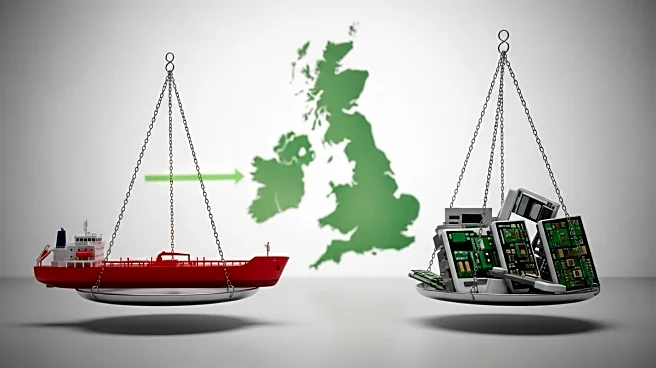What's Happening?
The United Kingdom has expanded its sanctions list to include 70 additional tankers associated with Russia's oil and gas industry, as well as suppliers of electronics and military components. This move comes as part of the UK's ongoing efforts to exert economic pressure on Russia amid the ongoing conflict in Ukraine. The sanctions target major Russian companies such as Sovcomflot, Rosneft, and Gazprom, and include vessels previously listed by the United States. The UK now has nearly 500 tankers on its sanctions list, surpassing the European Union's 444 and the United States' 200. The sanctions aim to cut off critical revenue streams for Russia, which is accused of using these funds to support its military operations in Ukraine. The UK has also sanctioned 30 entities and individuals involved in supplying key equipment for Russian weaponry, including companies based in China and Turkey.
Why It's Important?
The expansion of sanctions by the UK is a significant step in the international effort to isolate Russia economically and reduce its ability to finance military activities in Ukraine. By targeting the oil and gas sector, a major source of revenue for Russia, the UK aims to weaken Russia's economic stability and its capacity to sustain prolonged military engagements. The inclusion of electronics suppliers highlights the strategic focus on disrupting the supply chains critical to Russia's military capabilities. This move could have broader implications for global trade, particularly affecting companies in China and Turkey that are linked to the sanctioned entities. The sanctions also underscore the UK's commitment to supporting Ukraine and maintaining pressure on Russia in coordination with international allies.
What's Next?
The UK is likely to continue its strategy of increasing economic pressure on Russia through further sanctions and diplomatic efforts. The effectiveness of these measures will depend on the cooperation of international partners and the ability to enforce compliance among targeted entities. The response from Russia and its allies, as well as the impact on global oil markets and supply chains, will be closely monitored. Additionally, the UK and its allies may explore further actions to support Ukraine and counter Russian aggression, potentially leading to more comprehensive sanctions or military support.
Beyond the Headlines
The sanctions raise ethical and legal questions about the use of economic measures as a tool of foreign policy and their impact on global trade dynamics. The targeting of companies in third-party countries like China and Turkey could strain diplomatic relations and complicate international trade agreements. Furthermore, the sanctions highlight the challenges of enforcing compliance and the potential for unintended economic consequences, such as disruptions in global supply chains and increased volatility in energy markets.









